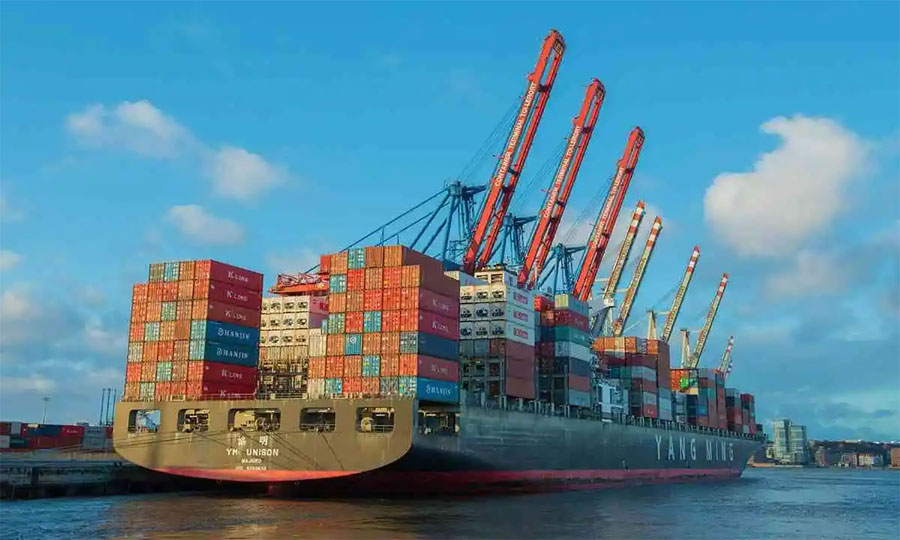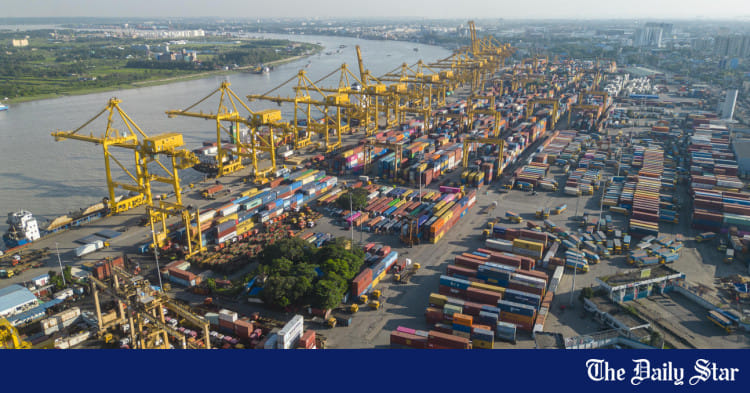Saif
Senior Member
- Joined
- Jan 24, 2024
- Messages
- 17,262
- Likes
- 8,334
- Nation

- Residence

- Axis Group


Ctg port deal beyond interim govt’s mandate: Tarique
It is making long-term commitments that will shape the country’s economic future, he says
Ctg port deal beyond interim govt’s mandate: Tarique
It is making long-term commitments that will shape the country’s economic future, he says

Tarique Rahman
Criticising the interim government for its long-term contract to lease out a key container terminal of Chattogram port to a foreign company, BNP acting chairman Tarique Rahman today said such steps should not be made by an unelected government.
"Now look at Chattogram Port, the gateway to Bangladesh's economy. What happens there shapes the lives of millions more than any political speech ever will. Recent long-term decisions about the port are not routine," he said in a Facebook post Monday night.
Google News LinkFor all latest news, follow The Daily Star's Google News channel.
He added that these were "strategic commitments over a national asset, pushed forward by an interim government without a democratic mandate to bind future generations."
Tarique also added that moving ahead with Bangladesh's planned LDC graduation in 2026 without an elected government's mandate could increase economic pressure.
"The BNP has stated this before that moving ahead with the 2026 graduation timeline without keeping the option of deferral alive is purely a political decision, being taken by an interim government that does not carry an electoral mandate," he added.
"And yet, is making long-term commitments that will shape the country's economic future for decades," he added.
The BNP leader said the situation at the port mirrors the approach to LDC graduation, where "strategic options are shut off, public debate is dismissed as inconvenient, and valid concerns are ignored in the name of speed and inevitability."
Bangladesh remains on track to sustainable graduation from the least-developed country (LDC) category, reflecting its resilience and strong policy commitment, according to the annual country report sent by the government to the UN Committee for Development Policy (UNCDP). The report was submitted to the UN panel early this month.
Tarique, however, said workers and small factories will bear the immediate burden of any shock linked to LDC graduation.
Referring to small garment factories in Narayanganj and Gazipur, he said, "When export pressure builds, overtime disappears first. Then shifts are cut. Then jobs. These are not headlines. These are silent crises inside ordinary homes."
"They never voted on that decision. They were never asked. They were never shown the real numbers. That is why the debate around Bangladesh's LDC graduation matters so much more than official statements make it seem," he added.
He further said the public is being told that any delay is "impossible" and that even asking for a deferral would be considered a "humiliation," which the UN would not consider.
"But if we all look closer, history tells a more complex story. Countries such as Angola and Samoa have had their graduation timelines adjusted. The UN rules themselves allow flexibility when countries face economic shocks. Asking for time on country-shaping consequences is just responsible governance by an interim government," he said.
Tarique said even government documents acknowledge pressures already being felt in the banking sector, foreign exchange market, rising debt risks, and slowing exports.
"This is not an argument against graduation. Bangladesh has earned the right to move forward. But having the 'right' to graduate is not the same as being 'ready' to graduate," he said.
"I consider real national strength not as the absence of doubt in decision-making. Real national strength is to have the discipline to ask hard questions before the cost becomes irreversible," he added.
He also said the issue was not about personalities or attacking individuals but about "protecting institutions and the principle that decisions which shape decades of national life should be made by governments that are accountable to the people."
"No one is saying we should not graduate from LDC status or reform our ports. The argument is simpler, and more fundamental: the future of a nation should not be locked in by a government that the nation did not elect," he said.
Earlier, on September 16 this year, Tarique said Bangladesh's graduation from the UN's LDC category in November 2026 is a milestone, but warned that the accompanying risks and challenges to the economy and people must be addressed urgently to reap its benefits.
It is making long-term commitments that will shape the country’s economic future, he says
Tarique Rahman
Criticising the interim government for its long-term contract to lease out a key container terminal of Chattogram port to a foreign company, BNP acting chairman Tarique Rahman today said such steps should not be made by an unelected government.
"Now look at Chattogram Port, the gateway to Bangladesh's economy. What happens there shapes the lives of millions more than any political speech ever will. Recent long-term decisions about the port are not routine," he said in a Facebook post Monday night.
Google News LinkFor all latest news, follow The Daily Star's Google News channel.
He added that these were "strategic commitments over a national asset, pushed forward by an interim government without a democratic mandate to bind future generations."
Tarique also added that moving ahead with Bangladesh's planned LDC graduation in 2026 without an elected government's mandate could increase economic pressure.
"The BNP has stated this before that moving ahead with the 2026 graduation timeline without keeping the option of deferral alive is purely a political decision, being taken by an interim government that does not carry an electoral mandate," he added.
"And yet, is making long-term commitments that will shape the country's economic future for decades," he added.
The BNP leader said the situation at the port mirrors the approach to LDC graduation, where "strategic options are shut off, public debate is dismissed as inconvenient, and valid concerns are ignored in the name of speed and inevitability."
Bangladesh remains on track to sustainable graduation from the least-developed country (LDC) category, reflecting its resilience and strong policy commitment, according to the annual country report sent by the government to the UN Committee for Development Policy (UNCDP). The report was submitted to the UN panel early this month.
Tarique, however, said workers and small factories will bear the immediate burden of any shock linked to LDC graduation.
Referring to small garment factories in Narayanganj and Gazipur, he said, "When export pressure builds, overtime disappears first. Then shifts are cut. Then jobs. These are not headlines. These are silent crises inside ordinary homes."
"They never voted on that decision. They were never asked. They were never shown the real numbers. That is why the debate around Bangladesh's LDC graduation matters so much more than official statements make it seem," he added.
He further said the public is being told that any delay is "impossible" and that even asking for a deferral would be considered a "humiliation," which the UN would not consider.
"But if we all look closer, history tells a more complex story. Countries such as Angola and Samoa have had their graduation timelines adjusted. The UN rules themselves allow flexibility when countries face economic shocks. Asking for time on country-shaping consequences is just responsible governance by an interim government," he said.
Tarique said even government documents acknowledge pressures already being felt in the banking sector, foreign exchange market, rising debt risks, and slowing exports.
"This is not an argument against graduation. Bangladesh has earned the right to move forward. But having the 'right' to graduate is not the same as being 'ready' to graduate," he said.
"I consider real national strength not as the absence of doubt in decision-making. Real national strength is to have the discipline to ask hard questions before the cost becomes irreversible," he added.
He also said the issue was not about personalities or attacking individuals but about "protecting institutions and the principle that decisions which shape decades of national life should be made by governments that are accountable to the people."
"No one is saying we should not graduate from LDC status or reform our ports. The argument is simpler, and more fundamental: the future of a nation should not be locked in by a government that the nation did not elect," he said.
Earlier, on September 16 this year, Tarique said Bangladesh's graduation from the UN's LDC category in November 2026 is a milestone, but warned that the accompanying risks and challenges to the economy and people must be addressed urgently to reap its benefits.











































